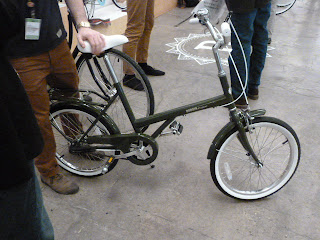Most of you, I suspect, ride or have ridden a bike with two chainrings. I would imagine, however, that none of you have ridden a bicycle with two chains that isn’t a tandem.
Some folks are about to have that experience. They’re not Grand Tour riders or triathletes; none (as far as I know, anyway) plan on embarking upon a cross-country or round-the-world tour.
Rather, they are folks who use their bicycles as taxis, pickup trucks and cargo vans. I encountered such riders in Cambodia and Laos and even rode bicycles like the ones they use. Those bikes, however, didn’t have the unique feature I mentioned at the beginning of this post.
So why, you ask, are some people about to ride a bike with two chains? And, where are they?
I’ll answer the second question first: Africa. I’ve never been there, but I imagine that parts of it are like the Southeast Asian countryside I saw: unpaved roads and paths with few, if any bike shops. And the shops that exist can’t order a part you need for your SRAM Red 13 speed shifter and have it delivered by Fed Ex the next day.
In such an environment, a bike that would need such a part would be all but useless. And it would be worse than impractical for hauling a 15 liter metal jug of milk from farm to village.
World Bicycle Relief has been working to address people’s needs in rural Africa and other parts of the world. It developed the Buffalo bicycle: a “tank” with wide tires, steel rims and a coaster brake. This was believed to be the bike with lowest possible maintenance. Also, because the bike has a coaster brake, it can be ridden with wheels that are significantly out-of true. Oh, and it has a rear rack that can support up to 200 pounds.
As you can imagine, the bike is heavy. But its users didn’t mind: Reliability is more important to them. That weight, however, combined with its coaster brake hub—which has only one gear—meant that most people couldn’t ride it up a hill, especially if it was loaded.
A new version of the Buffalo bike is designed to deal with that problem. So why two chains?, you might ask.
Well, each chain runs on one of the two chainwheels—and one of the two sprockets on the rear. Those sprockets are part of a freewheel that looks like a wider version of the ones found on BMX bikes. One chain wraps around the smaller sprocket and chainwheel while the other winds around the larger sprocket and chainring.
This arrangement results in a two-speed bike without a derailleur, internally-geared hub or coaster brake. So how does the bike “shift?”
Well, the freewheel contains a mechanism that disengages one gear while the other is being used. So, if you are pedaling in one gear, the chain still spins on the other. And the “shift” is made by pedaling backwards, just as you would on a coaster brake.
Achieving that, of course, meant giving up that coaster brake. Instead, a pair of dual pivot brakes binds on robust alloy rims to stop or slow down. As the developers explain, some strength may be sacrificed but, apparently, there’s still enough to support a 200 pound load in addition to the rider. And it’s also easier to true an alloy rim.
Oh, and everything on the bike—including the freewheel mechanism—can be fixed with a tool that looks like an oversized version of the old Raleigh spanner—or an adjustable wrench.
I, for one, would be interested to try such a bike, if for no other reason than to experience the two-speed, two-chain system. And I am always happy when a practical bike—whatever that means for a particular place or kind of user—is designed.








